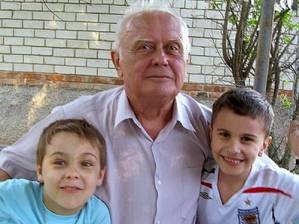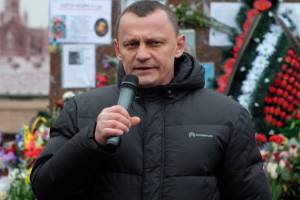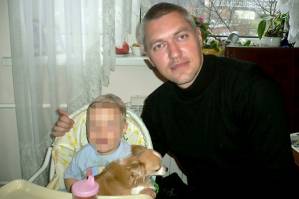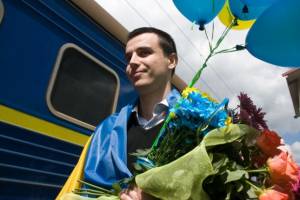Moscow shouts ‘abduction’ yet holds Ukrainian hostages incommunicado

Yury Soloshenko and his grandchildren
While Ukrainians have either disappeared without trace after being taken prisoner in Russia over the last year, or are being denied access to lawyers and the Ukrainian consul, the Russian Foreign Ministry has issued a warning to its own nationals travelling abroad that they could face arrest or detention. Ukraine is not mentioned, perhaps wisely given that Moscow’s attempt to deny responsibility for two spetsnaz intelligence officers captured in Donbas by claiming they had left the military service has been denied by the men themselves.
The threat to Russians travelling abroad is allegedly from “the USA and third countries”, with Russia’s wrath this time aroused by the extradition, referred to as “kidnapping”, of Vladimir Drinkmann whom America wants to try “in the biggest data-breach prosecution in U.S. history”. The USA’s alleged “kidnapping” and “hunting down” of Russian nationals by “twisting the arm” of other countries is how the Foreign Ministry describes an extradition process in Holland which lasted 2 years. An alternative version to Moscow’s allegations about the “abduction” of Roman Seleznev, whom the USA is also planning to prosecute on hacking charges, can be found here.
There is little or no information about some of the Ukrainian nationals taken prisoner by Russia. In fact, while Seleznev, Drinkman and others are accused of offences punishable in any country, there are serious grounds for assuming that many Ukrainians are in detention specifically because they are Ukrainian – not a felony in the USA or other countries.
There are also Russians (and one Belarusian, living in Russia) who are imprisoned or facing charges linked with their support for Ukraine and opposition to Russia’s annexation of Crimea and aggression in eastern Ukraine. They include three men on trial in Kaliningrad over a flag; Russian poet and teacher Alexander Byvshev; LGBT activist and blogger Andrei Marchenko and Belarusian Kirill Silivonchik. Svetlana Davydova, mother of 7, including a 2-month-old infant whom she was still breastfeeding, was only released after her detention was reported in the press and caused outrage. She had been charged with ‘treason’ because of a phone call made to the Ukrainian embassy back in April 2014 warning that Russian soldiers from Smolensk were being sent to Donbas.
Civic activists point out that the detention of Ukrainian nationals began back in March 2014, i.e. soon after Russia’s invasion of Crimea, with the FSB [Security Service] first targeting people coming to Russia for work. They were interrogated for their links with ‘radicals’, etc., but all were released after a few days. Others have not been so fortunate.
Oleksandra Matviychuk, head of the Centre for Civil Liberties [CCL] reports that civic activists know of 12 Ukrainians held prisoner in Russia on politically motivated charges, though the number could be considerably higher. CCL, together with Euromaidan SOS and other organizations have launched a campaign entitled #LetMyPeopleGo, aimed at drawing attention to the plight of Ukrainians held prisoner in Russia.
Drawing attention to a black hole
The worst situation is where virtually nothing is known with the person either having disappeared altogether or being refused access to a lawyer or Ukrainian consul.

Mykola Karpyuk, from the nationalist organization Right Sector which Russia has consistently demonized, was detained in March 2014 on entering Russia. There were reports in the Russian media at the time, claiming attempts by Ukrainian nationalists to carry out terrorist attacks in Russia, however the official documents seen apparently accuse Karpyuk of involvement in illegal armed formations in Chechnya during the 1990s. Karpyuk’s family and lawyer deny that Karpyuk ever fought in the Russian Federation, though he was involved in events during the 1990s in Abkhazia and Transnistria.
Karpyuk has not been seen since he was taken prisoner, and one of Nadiya Savchenko’s lawyers Ilya Novikov suggested in May this year that he may be dead.

Nothing is known of Stanislav Klykh, a journalist who was detained in September 2014 when he entered Russia to visit his girlfriend. He has been moved to three different regions, but there was no information to indicate any specific charges against him, and nothing has been heard for months now. In April, the Russian Consul was summoned to Ukraine’s Foreign Ministry and handed a note of protest over violation of the rights of Karpyuk and Klykh.
The charges against Serhiy Litvinov are linked to and as spurious as those against Nadiya Savchenko, former military pilot, now Ukrainian MP and delegate to the Parliamentary Assembly of the Council of Europe.
At least two Ukrainians are facing ‘spying’ charges in Russia: Yury Soloshenko who turned 73 in a Moscow SIZO [remand prison] in May and Valentin Vyhivsky, a 32-year-old engineer. More details about the detention of Soloshenko can be found here. His case is one of unprecedented lawlessness, made especially shocking given Soloshenko’s age and poor health. He was arrested on his arrival in Moscow in August 2014, and has been held in detention ever since. After the lawyer imposed by the investigators clearly saw his task as being to persuade Soloshenko to ‘confess’, Soloshenko’s family agreed with human rights lawyer Ivan Pavlov that he would represent Soloshenko. Pavlov was the person who managed to get Davydova released, and the charges dropped, and it seems likely that the Russian authorities are preventing Pavlov and the Ukrainian consul from seeing Soloshenko to avoid information getting out about totally fabricated and implausible ‘spying’ charges.
Some of the arrests have, of course, become internationally known – that of Nadiya Savchenko and of four opponents of Russia’s annexation of Crimea, including renowned film director Oleg Sentsov and civic activist Oleksandr Kolchenko. The latter are facing 20 year sentences effectively for refusing to ‘cooperate’ with the investigators as did the other two – Oleksiy Chirniy and Gennady Afanasyev.
One other prisoner has been left to the last, as the one positive case, indicating the vital importance of publicity and proper defence. Lviv law student Yury Yatsenko and Bohdan Yarychevsky were detained last May after Kursk police officers who’d stopped only to check their papers learned that the two young men were not only from Ukraine, but from Lviv, regarded by all too many brainwashed Russians as a hotbed of right-wing ‘nationalism’. The FSB did everything they could to torture and threaten the two men into testifying against the Ukrainian government. When this failed, they deported Yarychevsky, but trumped up charges against Yatsenko which a first instance court meekly accepted, handing down a conviction and 2-year-sentence.
Yatsensko’s lawyer Pyotr Zaikin was eloquent and convincing at the appeal hearing, but probably also just lucky that the judge proved unwilling to annoy the FSB by acquitting Yatsenko, but with too much of a conscience to allow the monstrous travesty of justice. He reduced the sentence to the time that Yatsenko had already spent in detention, and Yury Yatsenko was able to return home on May 8.

A happy ending in all other cases seems very far off, but each of the prisoners urgently requires support and maximum publicity. Silence on even one of the cases fuels a dangerous sense of Impunity and increases the likelihood of even more politically motivated arrests of Ukrainians.





